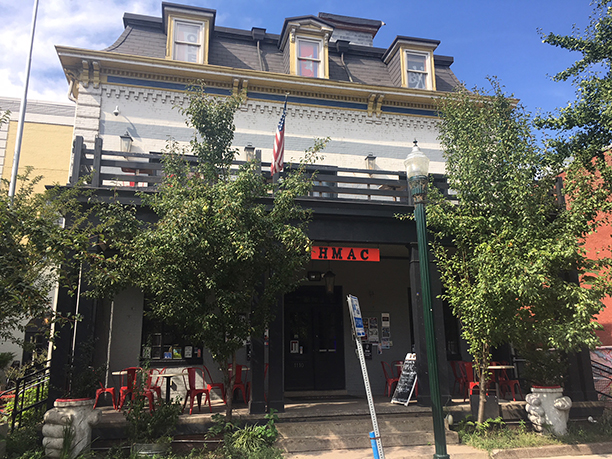
Making good on a promise he issued this summer, the owner of a Harrisburg bar, restaurant and entertainment venue has filed a lawsuit against more than a dozen people who he claims defamed him and his business on social media websites.
John Traynor, owner of the House of Music, Arts and Culture (HMAC) on N. 3rd Street, filed a civil suit this morning with the Dauphin County prothonotary against 14 individuals and one online news blog.
The suit charges all defendants with one count of defamation against HMAC, one count of defamation against Traynor himself, and one count of tortious interference of business relationships.
The plaintiffs, which include Traynor and HMAC’s parent company, Traynor, Bartlett & London LLC, seek a minimum award of $50,000 in compensation and punitive damages on each count.
The suit says the defendants “acted individually and/or in concert to publish false, malicious and defamatory statements about HMAC and John Traynor on social media websites, public websites and other internet websites” starting in November 2017.
Some of the statements detailed in the suit accuse Traynor of sexual assault. Others characterize HMAC a “safe haven” for rapists and sexual predators.
The lawsuit says that the “absolutely false” claims harmed the public reputations of Traynor and HMAC and interfered with business operations.
The action comes three months after HMAC’s owners filed for Chapter 11 bankruptcy and announced they would sell their business. This fall, Traynor blamed the business’s financial troubles on a social media firestorm that ignited in July, when an HMAC customer claimed that she was drugged inside the bar and later raped at another location in Harrisburg.
That woman, who is named as a defendant in the civil suit, said that HMAC’s staff failed to recognize her as a victim of date rape drugs and asked her to exit the bar, leaving her vulnerable to her attacker.
She posted those allegations on HMAC’s public Facebook page on July 28 and deleted them within an hour, Traynor said. Her original post is included as evidence in the suit Traynor filed this morning.
The Harrisburg Police Bureau investigated the assault and charged a suspect, Michael Ray Wright, with the woman’s rape on July 30. Over the course of their investigation, they found that HMAC’s staff could not have prevented the attack.
But a screenshot of the woman’s post circulated in online community groups. It was also the subject of a story on the Philadelphia-based blog YC.news, which, along with its proprietor, was named a defendant in today’s complaint.
In the Midtown Harrisburg Facebook group, the post generated hundreds of comments, including ones alleging unscrupulous business practices by HMAC and Traynor.
Traynor said that the accusations led some patrons to boycott HMAC, which houses a full-service bar and restaurant in addition to its performance venues.
He also said some of HMAC’s critics contacted bands and booking agents, urging them to cancel shows they had scheduled at the venue.
The episode damaged HMAC’s reputations and revenues, Traynor said. He told TheBurg in September that he would sue those people for tortious interference of contract and defamation.
According to one media law expert, a statement is considered defamatory in a court of law if it is false, causes harm to one’s reputation and causes monetary or emotional damages.
If a plaintiff in a defamation case is a public figure, he or she must prove that defendants acted with “actual malice” by knowingly making false statements that would cause the plaintiff harm.
That burden of proof disappears when the person bringing a defamation suit is a private citizen.
“It’s a less difficult case to make if you’re not a public figure,” said Melissa Melewsky, media law counsel at the Pennsylvania NewsMedia Association. “There doesn’t have to be intent to harm. There only has to be actual harm.”
Some harmful statements are considered protected speech if they are found to be opinions. But statements that accuse someone of a crime are “per se defamatory” if they are not true, Melewsky said.
Today, Traynor maintained that all the statements against him were baseless and that they “jeopardized” the livelihood of HMAC’s owners and employees.
Traynor’s lawyer did not return a request for comment.
Most civil suits are settled before they can go before a jury, Melewsky said. The next step is for defendants to answer to the charges against them, at which point both parties will begin to gather evidence in a pre-trial “discovery” phase.
HMAC appeared in court this fall to defend its liquor license before a Liquor Control Board hearing examiner. The PLCB has not yet ruled on the renewal of the license, which expired earlier this year.
Ed Note: In this story, we originally attached a copy of the complaint. We took down the document to further vet it after being alerted that it may contain certain sensitive information.






